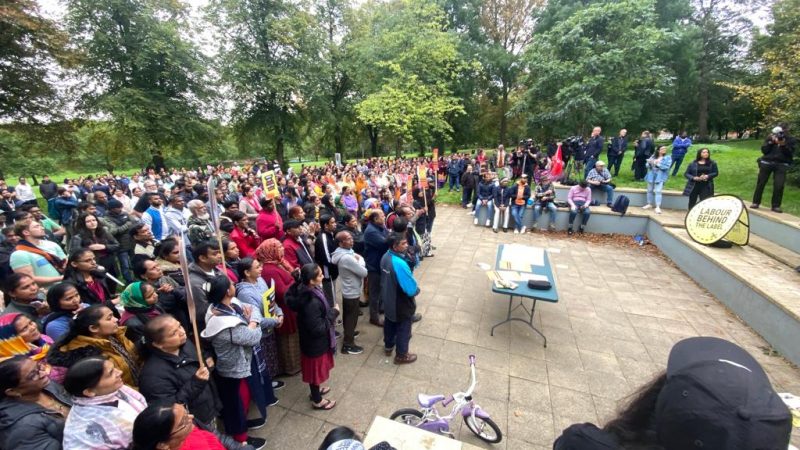Campaigners demand an end of the 'race to the bottom' from fashion brands

Garment workers in Leicester are demanding job security and improved working conditions as they launched a mass demonstration to protect their livelihoods on Sunday.
For generations, factory workers in Leicester have given years of their life to the clothes-making industry, however they currently face worsening conditions and job instability.
An estimated 500 people attended the rally where workers and supporters called for UK fashion brands to protect garment jobs and for improved wages and conditions.
The number of factories in Leicester have halved since 2020, from 1,000 to less than 500, according to the charity Labour Behind the Label who organised the rally.
“For the last year, garment workers have seen factories close, jobs cut and hours slashed. They get called to work one week, and then hear nothing for a month. At the same time, rent and prices are relentlessly going up. This crisis must end,” said Kaenat Issufo, Community Engagement Lead at Labour Behind the Label.
Issufo called for the government to step in to regulate brands’ behaviour ensuring an end to ‘bullying and discount demands’ from fashion companies.
“We need mandatory human rights due diligence legislation – this is key if we want a more ethical industry,” said Issufo.
Previous warnings over a crisis in the industry were made when fast-fashion brands were found to have forced discounts on suppliers, leading to factories closing down causing job losses or seriously reduced hours for workers.
Labour Behind the Label is demanding an end of the ‘race to the bottom’, calling for fashion brands to ‘commit to their workers’ and recognise the vital role they play in building the companies huge profits.
Lotika from the campaign group India Labour Solidarity told LFF that garment workers faced racialized and gendered ‘occupational segregation’ in their work, and called out the government’s anti-immigration policies which ‘constrain immigrant workers from voicing their exploitation’.
“The fashion industry in particular today is embedded in the wider neoliberal globalised supply chain business model in which the workers are largely invisible to the company for which they make products,” said Lotika.
“Brands can distance themselves from the factory/sweat shop floor and simply focus on their own ‘growth’ without little if any thought for the labour rights of the workers producing their products.”
Lotika said traditional union engagement remains low in the sector due to casualised work, which, along with flawed labour inspection regimes, has meant employers are able to exploit their workers through casual contracts, low wages and poor working conditions.
Workers are demanding good jobs, as well as assurance that a fixed percentage of the brands products be produced in the UK to ensure the stability of the industry.
“Sweatshop/factory owners must not be able to say to the worker that if they demand their fair wages and work conditions they will relocate production overseas. Both the factory owner and the worker must be assured of the stability of the industry,” said Lotika.
As well as this, Lotika said the dignity of workers must also be protected, which means the state valuing and recognising them, for example ensuring English learning facilities are available and working for the people.
“The state needs to treat them not just as “immigrant” racialised labouring bodies but value them as people, ensuring their welfare and specific needs.”
(Image credit: India Labour Solidarity)
Hannah Davenport is news reporter at Left Foot Forward, focusing on trade unions and environmental issues
Left Foot Forward doesn't have the backing of big business or billionaires. We rely on the kind and generous support of ordinary people like you.
You can support hard-hitting journalism that holds the right to account, provides a forum for debate among progressives, and covers the stories the rest of the media ignore. Donate today.



